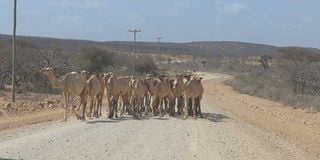Mandera’s improved roads end years of anguish for locals

One of the improved roads in Mandera North. With the onset of devolution, traders are enjoying an improved road network in Mandera with the county government having invested Sh8.6 billion in the Roads and Transport department since 2013. PHOTO | MANASE OTSIALO | NATION MEDIA
What you need to know:
- No motorist would attempt a journey on almost all inter-county roads in a two-wheel drive vehicle.
- In 2013, a new dawn was ushered in, according to Mr Mohamud.
- Better roads have also impacted positively on the health sector.
- Herders in the county are also enjoying quick access to water points and grazing fields across the county.
Mr Hussein Mohamud is a livestock trader in Mandera County.
Soft spoken and with a dyed beard, he appears to be from another era not too long ago, one in which the rough terrain that was the roads in Mandera demanded thick-skinned travellers.
No motorist would attempt a journey on almost all inter-county roads in a two-wheel drive vehicle. Transport was exclusively by trucks.
Owners of four-wheeled vehicles have been charging up to Sh30,000 a day for transport services within the county for car hire services.
ANGUISH
Mr Mohamud has traded in livestock for over 20 years on these roads that have caused him a lot of anguish.
A journey from Mandera town at the triangular point on the Kenyan geographical map to Takaba in Mandera West, a distance of 420 kilometres, has always taken him 14 hours.
Ideally, it should take just over five hours to cover the distance driving at 80kph on a smooth road.
NEW DAWN
In 2013, a new dawn was ushered in, according to Mr Mohamud.
“Before devolution, it was not easy to cover this distance in a day unless your vehicle was in good condition,” he says.
Accessing livestock markets in the interior parts of Mandera like Malkamari, Rhamu Dimtu, Guticha and Gither was a nightmare for many livestock dealers.
“An improved road network has made our business environment better in Mandera by reducing on maintenance expenses for our vehicles,” he says.
EXCITED
Ms Saadia Ali Abdulllahi from Rhamu Dimtu, also in business, is excited too.
“I now take my farm produce to the market in Rhamu town on time unlike before when it took me long hours on the roads,” she said.
From the fertile riverine farms of Rhamu Dimtu, Ms Abdullahi supplies tomatoes, onions, mangoes and sukumawiki to Rhamu market, 30 kilometres away.
“My customers are getting fresh foodstuffs on time because the roads are better and I take less time to deliver unlike before,” she says.

A road under construction in Mandera. PHOTO | MANASE OTSIALO | NATION MEDIA
HEALTHCARE
Ms Halima Bulle, a local midwife in Kutayu in Mandera south says better roads have impacted positively on the health sector.
“Referrals to hospitals are fast unlike before when we would use donkey carts to take expectant mothers to hospitals,” she says.
The improved road network has contributed to the reduction in maternal mortality rate in Mandera that stood at 3,795 before devolution.
“Ambulances now respond to distress calls fast in any corner of Mandera due improved roads and this has helped improve medical care in the county,” she says.
GRAZING FIELDS
Herders in the county are also enjoying quick access to water points and grazing fields across the county.
“My cattle, goats and camels easily get to water points through clear roads and I have no fear of losing my stock to wild animals like before,” says Mr Adan Gababo, a herdsman from Choroqo.
Since 2013, the Mandera County government has invested Sh8.6 billion in the Roads and Transport department.
Tarmacking of major roads within Mandera town has been a major milestone in the sector.
CHEAPER RIDES
Mandera town residents now enjoy cheaper rides with for taxi drivers experiencing reduced tare and ware compared to previous times.
“We have been able to tarmac more than 30 kilometres of our roads in Mandera town and this has improved living standards here,” said Ms Zulekha Harun, the county minister for Roads and Transport.
The first tarmacked road in Mandera town has come as a blessing to local businesses.
“We have seen tuk tuks and motorcycles in form of bodabodas introduced in the local transport business in the town because the roads are better,” said Ms Harun.
Before the road was tarmacked, Mandera town was characterized with sandy and dusty roads that light locomotive machines could not manage.
“We no longer get stuck in the sand or mud when it rains within the town and our vehicle are in good conditions,” said Mr Ali Adan Alio, a taxi driver in Mandera town.
SECURITY
Tarmacking of major roads within the town has reduced incidents of insecurity.
“Our operations are swift since the roads are clear and incidents of planted explosives have reduced, giving confidence to our officers to respond fast,” said Mr Ezekiel Singo’e, the Mandera town OCPD.
A bridge connecting two sections of Mandera town has been hailed as a welcome initiative by locals.
“Whenever it rained in Mandera or in Somalia, this town could be divided into two by flash floods and for days we could not cross over but all is fine now,” said Ms Fatuma Ali.
REDUCED DUST
She said infections from dust have reduced in the town since wind no longer blows dust.
At least 1,200 kilometres of roads in the county have been upgraded using murram according to Ms Harun.
“We are currently working on the Rhamu-Dimtu-Ardagabicha road, a stretch of 40km, Choroqo-Guba road (10Km) and Takaba-Gither road which is 40km,” said Ms Harun.
Other roads being worked on include the 20km Elwak-Kutayu stretch and Elwak town to Elwak airstrip, another stretch of 10km.
“We are keen on improving road networks at ward levels as the national government works on the B9 road,” she says.





